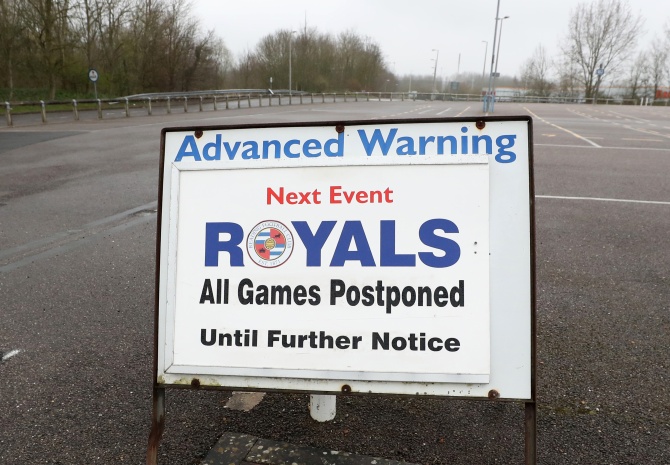'Revisit old footage, perhaps: Your favourite Messi goal, your most memorable Tendulkar century, your dearest Manchester United comeback.'
'Only then will we be able to grasp the lost meaning of why we watch sport, why we love it so much,' notes Dhruv Munjal.

The thing about sport is that it never stops. Or that's how it used to be, anyway.
Teams and athletes have played through torment and turbulence, braving bloody wars and bitter political conflicts.
Sport has metamorphosed into something more than just entertainment. It is a perennial source of optimism, a universal caregiver tailored to deal with grim times.
And it has been so, until now, when a scary virus has forced so many of us to retreat into lockdown and administrators to postpone sporting events across the world.
Premier League football has been suspended till April 30.
Euro 2020 has been pushed back by a year.
The French Open will be held in September instead of May.
There won't be a Wimbledon this year.
The Formula One season is effectively over even before a car could be rolled out on to the circuit.
And the Tokyo Olympics, despite the organisers's best attempts at calling for calm, has been pushed to next summer.
As much as so many of us live and breathe sport, catastrophes such as these help put things into perspective.
In the face of families losing loved ones, carrying on with any kind of sport is, quite frankly, stupid.
Not to mention how it puts the lives of so many athletes at risk. The very idea of sport right now sounds meaningless; a kind of background noise with nothing but echoes of irrelevance.
Liverpool being denied the title or Aston Villa going down is insignificant when you compare that with the cramped hospital wards in Italy, or the rapidly emptying supermarkets in the US.
The cancelling of sport is perhaps the most apt measure of how terrible the situation has become.
Sport possesses its share of palliative qualities, but it is also a reflection of normalcy, a distraction embedded so deeply in our routines that we often take it for granted.
European league football on Saturday evening marks the beginning of the weekend for many; a Federer-Nadal final caps it off on Sunday night.
In between all that, you say no to a family lunch or cancel a dinner date because you don't want to miss seeing Virat Kohli belt out another hundred, or P V Sindhu rise in a final, or Tiger Woods sink an improbable 20-ft putt on the 18th green to win a tournament.
Tuesdays and Wednesdays are reserved for the Champions League, Thursdays for the Europa League.
Experiencing sport has never been just a pastime, but a way of life.
An escape from the mundaneness of daily schedules, a gateway to undiluted happiness; a kind of therapy for the soul.
And that's why in this time of strife, we should, perhaps, not just miss sport, but also appreciate and celebrate it.
The hollowness so many of us are feeling at present is a reminder that the show elite athletes put on for us week in and week out is a privilege we must cherish.
The global commercialisation of sport, after all, has ensured that we are bombarded with so much of it that we seem to have forgotten its true value.
In a way, the mindless consumption of sport has meant that it has been drained of all its charm and magnificence.
This time off will perhaps give us an opportunity to introspect and reclaim some of that.
But what do you do in the meantime?
That people have to urgently stock up on groceries and jostle for precious millilitres of sanitiser might prove to be a distraction in the short term, but once the panic of it wears off and the overall state of things hopefully improves, the absence of sport will start to haunt -- an emptiness only devoted fans will be able to relate to.
That's why the best thing to do is to show a bit of patience, wait it out.
Revisit old footage, perhaps: Your favourite Messi goal, your most memorable Tendulkar century, your dearest Manchester United comeback.
Only then will we be able to grasp the lost meaning of why we watch sport, why we love it so much.
And that way, once it's all over, once the athletes return and the stadiums open, we will be able to enjoy it even more.
And who knows, once some normalcy is restored, sport may offer the healing touch it almost always does, uniting grieving populations and springing hope by using a rare kind of universal power only it has the capacity to wield.
A cricket feature to make you smile
April 2, 2011: When Dhoni led India to World Cup glory
SEE: What our cricketers are up to!
Lockdown Games: 'Finished 10K run within the 4 walls'
Games Indians are playing during the lockdown